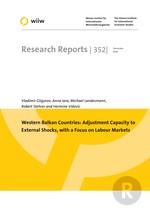Western Balkan Countries: Adjustment Capacity to External Shocks, with a Focus on Labour Markets
Vladimir Gligorov, Anna Iara, Michael Landesmann, Robert Stehrer and Hermine Vidovic
wiiw Research Report No. 352, December 2008
136 pages including 35 Tables and 40 Figures
The main question addressed in this study is the performance of the labour markets in the Western Balkans. The aim is to find out whether they can deliver growth of employment and decline of unemployment in the medium run and whether they can withstand short-term shocks due to changes in demand or supply. These questions are particularly pressing in view of the monetary policy based on fixed exchange rates which is followed by the majority of the countries in this region. In terms of the theory of optimal currency areas, if the exchange rate is fixed, labour markets have to be flexible if there are adverse shocks. Otherwise, adjustment would work through a fall in employment levels and an increase in unemployment. The alternative of flexible exchange rates has been abandoned by most monetary authorities in the region for fears of risk of an exchange rate crisis.
Keywords: Western Balkans, optimum currency area, labour market flexibility, external disequilibria, wage-setting
JEL classification: E24, F15, F16, F41, F42, J3, J4, D57
Countries covered: Albania, Bosnia and Herzegovina, Bulgaria, Croatia, North Macedonia, Montenegro, Romania, Serbia, Slovenia, SEE, Visegrad countries
Research Areas: Macroeconomic Analysis and Policy, Labour, Migration and Income Distribution
